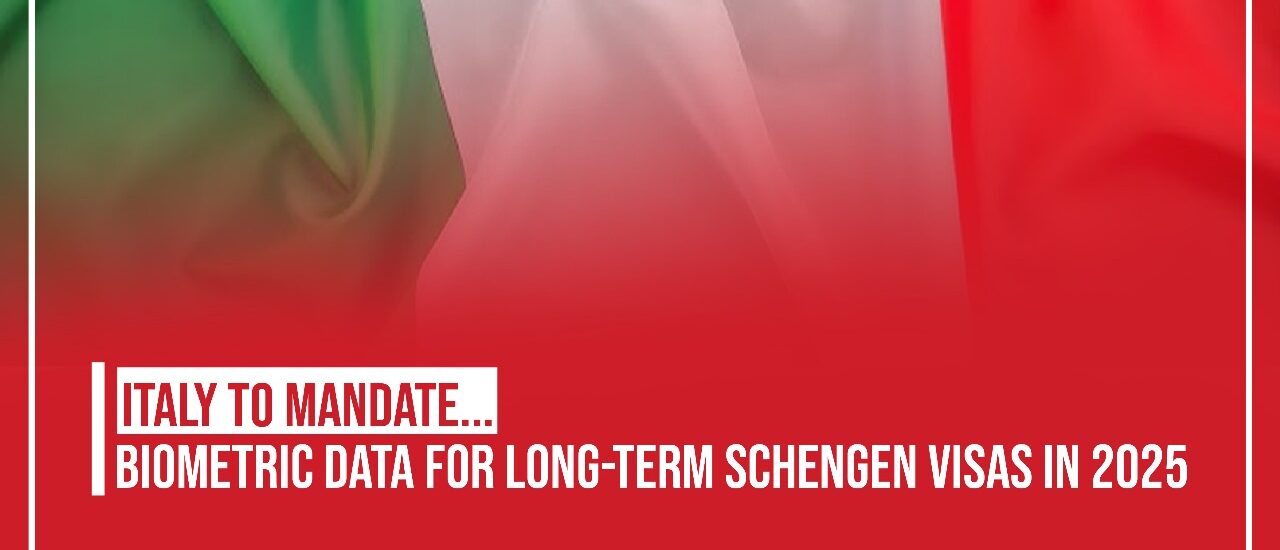Starting January 11, 2025, Italy is implementing a significant change to its visa application process. Long-term Schengen visa applicants will now be required to provide biometric data, such as fingerprints, at the nearest Italian embassy or consulate. This new regulation extends biometric requirements, previously mandatory only for short-term visas, to employment, study, family reunification, and investment visas.
At Makani Marketing, we recognize the importance of staying informed about global changes that affect international mobility. As experts in guiding individuals through the complexities of international regulations, we break down this new requirement and its implications for applicants.
Biometric Data for Long-Term Visas: An Overview
Biometric data collection for Schengen visas is not new. Since 2015, applicants for short-term Schengen visas have been required to provide fingerprints and a photograph. The extension of this requirement to long-term visas aims to bolster security measures and reduce the misuse of visas.
Applicants must appear in person at an Italian consulate to provide their biometric data. This process ensures that each visa application is securely linked to the individual’s unique data. Once collected, this data is stored for up to 59 months, offering applicants the convenience of avoiding repeat submissions for subsequent applications during this period.
While the biometric process itself takes only a few minutes, it introduces additional logistical steps, such as scheduling appointments and traveling to consulates, which could lead to delays for many applicants.
Impact on Visa Applicants
The mandatory biometric requirement is expected to have widespread implications for individuals seeking long-term visas in Italy.
Challenges for Students and Professionals
International students, employees, and family members applying for reunification visas will need to plan their applications carefully to accommodate this additional step. Italian consulates, particularly in high-demand regions, already experience significant backlogs. With the new requirement, securing appointments for biometric data collection may become even more challenging.
Students aiming to start academic programs or professionals with strict timelines for new job roles may face delays due to limited appointment availability. Moreover, applicants may incur additional costs, such as travel expenses to consulates and potential income loss from time off work.
Exemptions and Exceptions
The new rule does offer limited exemptions, including:
- Children under 12 years old.
- Individuals physically unable to provide fingerprints.
- Government officials traveling for official duties.
For most applicants, however, compliance with the fingerprinting requirement will be mandatory.
Why Italy is Expanding Biometric Requirements
The extension of biometric requirements to long-term Schengen visas aligns with Italy’s broader goals of enhancing visa security. By collecting biometric data, the Italian government can:
- Ensure accurate identification of visa holders.
- Prevent identity fraud and misuse of visas.
- Strengthen border security and align with EU-wide policies.
This move reflects Italy’s commitment to creating a secure and efficient visa system while maintaining its appeal as a destination for education, work, and family reunification.
Also Read: New Zealand Eases Post Study Work Visa Rules for International Students
Logistical Considerations for Applicants
To navigate the new biometric requirement effectively, applicants should:
- Plan Ahead
Start the application process early to secure an appointment for fingerprinting. Waiting times are expected to increase as demand rises, particularly in high-traffic regions. - Prepare for Additional Costs
Factor in travel expenses and potential income loss when planning the biometric appointment. - Leverage Existing Data
If you’ve previously submitted biometric data for a Schengen visa within the last 59 months, you may not need to repeat the process.
At Makani Marketing, we recommend that applicants familiarize themselves with the updated requirements and develop a detailed plan to avoid delays.
Implications for International Students and Skilled Workers
International Students
Students planning to pursue higher education in Italy may face added complexity in their application processes. As consulates face growing demand for appointments, students should work closely with their universities and start visa applications as early as possible.
Skilled Workers
Professionals seeking employment in Italy may also experience logistical challenges. Employers and applicants must collaborate to ensure compliance with the updated regulations and avoid disruptions to work schedules.
Italy’s new biometric policy underscores the need for clear communication and efficient planning for all parties involved.
Makani Marketing’s Take on the Biometric Rule
At Makani Marketing, we believe that every regulatory change presents an opportunity for better preparation and strategic planning. While the new biometric requirement introduces additional steps for long-term Schengen visa applicants, it also reinforces Italy’s commitment to security and efficiency.
We specialize in providing actionable insights to help individuals and businesses navigate complex visa processes. Whether you’re a student, a professional, or an employer, Makani Marketing is here to guide you through these changes seamlessly.
Benefits of the Biometric System
Despite the logistical challenges, the biometric system offers several advantages:
- Security: Ensures accurate identification and reduces visa fraud.
- Convenience for Repeat Applicants: Data remains valid for 59 months, streamlining future applications.
- Alignment with EU Standards: Enhances Italy’s reputation as a secure and well-regulated destination.
These benefits underscore the importance of adapting to the new system while appreciating its long-term value.
Conclusion
Italy’s decision to mandate biometric data for long-term Schengen visas marks a significant development in the country’s immigration policies. While the new requirement introduces additional administrative steps, it ultimately enhances security and aligns Italy with EU-wide best practices.
At Makani Marketing, we understand the complexities of global mobility and the importance of staying informed. By offering expert guidance and up-to-date insights, we aim to empower individuals and businesses to navigate these changes with confidence.
Stay connected with Makani Marketing for the latest updates and expert advice on international mobility. Let us help you turn challenges into opportunities as you plan your journey to Italy and beyond.
Makani Marketing – Real Solutions, Real Impact.





